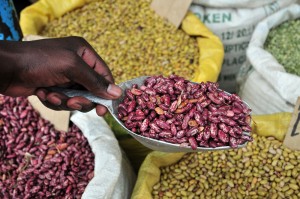Urgent need to transform key food producing regions in Africa by 2025

Joint University of Leeds, CIAT, CGIAR and CCAFS press release:
Agriculture in parts of sub-Saharan Africa must undergo significant transformation if it is to continue to produce key food crops, according to a new study published today in Nature Climate Change.
The study shows that maize, beans and bananas are most at risk from climate change.
The research is the first to allocate timeframes for changes in policy and practice in order to maintain production levels and avoid placing food security and the livelihoods of smallholder farmers at risk.
Study lead author Dr Julian Ramirez-Villegas from the University of Leeds, who is working with the CGIAR Research Program on Climate Change, Agriculture and Food Security (CCAFS), said: “This study tells where, and crucially when, interventions need to be made to stop climate change destroying vital food supplies in Africa.
“We know what needs to be done, and for the first time, we now have deadlines for taking action.”
The study examines region-by-region the likely effect of different climate change scenarios on nine crops that constitute 50% of food production in sub-Saharan Africa.
While six of the nine crops studied are expected to remain stable under moderate and extreme climate change scenarios, up to 30% of areas growing maize and bananas, and up to 60% of those producing beans are projected to become unviable by the end of the century. In some areas transformations will need to take place as soon as 2025.
Transformation could mean changing the type of crop grown in the area in question, improving irrigation systems, or in extreme circumstances, moving away from agriculture altogether.
Co-author Professor Andy Challinor, from the School of Earth and Environment at the University of Leeds, said: “Agriculture needs to be flexible as it responds to climate change, and this study shows where and when transformations will be needed. The study predicts that within the next decade many maize- and banana-growing areas of sub-Saharan Africa will not be suitable for those crops. “Banana imports from sub-Saharan Africa to the UK have more than doubled since 2001, showing that this issue has implications well beyond Africa’s borders. The places in which crops are grown will need to alter as climate changes. The key is to plan for those changes.”
Given that solutions such as breeding improved crops can take a minimum of 15 years to complete, the authors stress the need for immediate action.
Co-author Dr Andy Jarvis, who leads CCAFS research on Climate-Smart Agricultural Practices, said: “It can take decades to adjust national agricultural development and food security policies. Our findings show that time is running out to transform African agriculture.
“This will require not only increased funding but also a supportive policy environment to bring the needed solutions to those affected. We also need to ensure that the needs of women and marginalised groups are built into adaptation policies, to ensure they can be successfully implemented.”
Adaptation strategies will vary greatly across sub-Saharan Africa, given the highly different local contexts. Extensive research by CCAFS is already informing African governments and policymakers on the technologies and policies that can successfully help farmers to adapt to climate change in these countries.
For example, in Uganda, intercropping banana with coffee has been found to raise incomes by 50% and builds resilience to climate change impacts. In Senegal, climate information services are now available to more than 7 million rural people, via SMS and radio broadcasts, helping them make better farming decisions. And across the entire region, the Drought Tolerant Maize for Africa initiative has benefited 30-40 million people in 13 African countries by raising their maize yields.
ENDS
Further information
The study, “Timescales of transformational climate change adaptation in sub-Saharan African agriculture”, is published in Nature Climate Change on 7 March 2016.
For interview requests for Dr Julian Ramirez-Villegas or Professor Andy Challinor, please contact Sarah Reed, Press Officer at the University of Leeds, on +44 (0)113 343 4196 or email s.j.reed@leeds.ac.uk
For interview requests for Dr Andy Jarvis, please contact Liz Sharma at Marchmont Communications on +44 (0)7963 122988 or email liz@marchmontcomms.com
The University of Leeds is one of the largest higher education institutions in the UK, with more than 31,000 students from 147 different countries, and a member of the Russell Group research-intensive universities. We are a top 10 university for research and impact power in the UK, according to the 2014 Research Excellence Framework, and positioned as one of the top 100 best universities in the world in the 2015 QS World University Rankings. www.leeds.ac.uk
CGIAR is a global research partnership for a food secure future. Its science is carried out by the 15 research centers who are members of the CGIAR Consortium in collaboration with hundreds of partner organizations.
The International Center for Tropical Agriculture (CIAT) – a member of the CGIAR Consortium – develops technologies, tools, and new knowledge that better enable farmers, especially smallholders, to make agriculture eco-efficient – that is, competitive and profitable as well as sustainable and resilient. Eco-efficient agriculture reduces hunger and poverty, improves human nutrition, and offers solutions to environmental degradation and climate change in the tropics. With headquarters near Cali, Colombia, CIAT conducts research for development in tropical regions of Latin America, Africa, and Asia. CIAT is the lead center of CCAFS.
The CGIAR Research Program on Climate Change, Agriculture and Food Security (CCAFS), led by CIAT, brings together the world’s best researchers in agricultural science, development research, climate science and Earth System science, to identify and address the most important interactions, synergies and tradeoffs between climate change, agriculture and food security.
www.ccafs.cgiar.org
